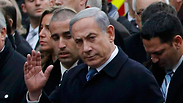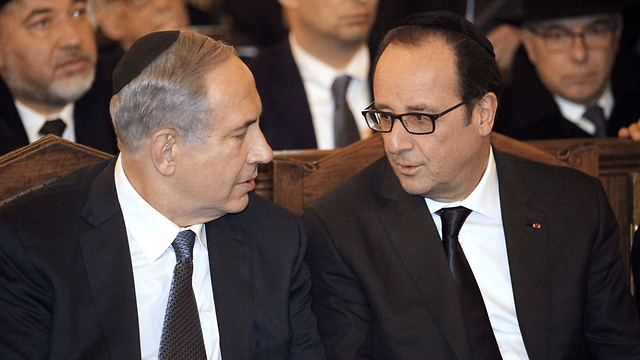
Israel must tread carefully and wisely with France
Analysis: Jerusalem's efforts to bring Paris in line with own policies on the Palestinians after the attacks in France did not work, and will only further distance a needed ally in confronting Iran.
The two recent terror attacks in Paris were perceived differently in France and Israel, and the way in which the victims were mourned only highlighted the differences.
The vast majority of the French public saw the attack on the offices of the Charlie Hebdo weekly as a seminal event in the history of France, while the attack at the kosher supermarket Hyper Cacher was perceived as an act of terrorism that killed four French people of the Jewish faith.
The vast majority of Israelis saw the attack at the supermarket as the primary incident - both because the target was clearly Jewish and because all four of the victims were Jews. The fact that they were buried in Israel intensified identification with the second event and its significance, while France preferred to highlight the first event and the universal nature of the murder of the 12 people at the newspaper.

The French authorities have invested great effort in avoiding any impression that the state identifies with the entirety of Israeli policies in the conflict with the Palestinians. Israel, according to its spokesmen, highlighted the call to France - and indeed, the world - to make both events into an opportunity to unify the narrative when it comes to terrorism.
Israel's focus on the four Jews who were buried in Israel was obvious - all of the nation's leaders were there to mourn them and honor them. The two Jews killed in the first attack and who were laid to rest in France have so far not received much attention. The woman victim, Elsa Cayat, was laid to rest by the Reform Jewish community in Paris; a woman rabbi conducted the service.
Prime Minister Benjamin Netanyahu's call for French Jews to consider moving Israel, given the circumstances, came against a backdrop of harsh criticism of the French security services in Israel, which claimed that they had failed.
The first two days after the terrorist acts also saw Israeli officials say that Jerusalem planned to raise with Paris the subject of increased security for the Jewish community there. I doubt that the Jewish community had asked for this intervention, and it certainly did not increase official French sympathy for Israel and its policies, nor did it warm French public opinion to Israel.
Just as it is right to draw conclusions from the way Israel behaved, it is also worth taking note of the way our enemies conducted themselves. Hamas, and even more so Hezbollah, condemned the attacks. Hezbollah leader Hassan Nasrallah made a strong statement, stressing the harm that the attacks caused to their own struggle, especially against Israel.
There is no doubt about the blatant hypocrisy of the Lebanese Shiite leader. But he read the map correctly – and Israel needed to focus its efforts on thwarting any attempts by Nasrallah to distance himself and his movement from the attacks. Ignoring his words hurt us, and will do so again in the future.

Even in times of great mourning, Israel cannot forget its own fundamental needs, and therefore should maintain channels of dialogue with countries that can affect the way in which the issue of terrorism is tackled, France being one of them.
The attempt to use the attacks to bring France in line with Israel's policies regarding the Palestinians - that is, unity not only in the face of al-Qaeda and Islamic State, but against Mahmoud Abbas too – was unsuccessful and only deepened the dangerous gaps between Paris and Jerusalem.
France now faces the urgent need to formulate a policy on the millions of Muslims who live there, most of them French citizens. Israel has nothing to contribute to this issue, but the outcome of the French government's deliberations will affect us - and therefore Israel must tread with care, sensitivity and intelligence.
Efraim Halevy is a former Mossad chief.










